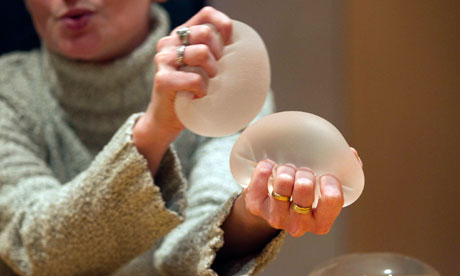
The government is to urgently review the risk posed to thousands of women from faulty breast implants, the health secretary has announced.
The review will re-examine conflicting data about the potential dangers posed by implants made by Poly Implant Protheses (PIP), the French firm accused of using cheaper industrial silicone rather than approved medical material, said Andrew Lansley.
Lansley said new data provided on Friday conflicted with previous information supplied to the Medicines and Healthcare Products Regulatory Agency (MHRA).
The health watchdog had previously indicated the risk of the implants rupturing was 1%, rather than the 3.6% estimated by France.
Lansley said the NHS medical director, Professor Sir Bruce Keogh, would now carry out a review of the situation. The MHRA will also conduct an audit of its evidence to resolve concerns about the "content and quality of the data that cosmetic surgery providers are sharing with the regulator".
"We are doing everything we can to ensure that women with these implants get the best possible advice," Lansley said.
"So far, all the evidence from around the world suggests that women should not be worried and that there have not been abnormal levels of problems reported with these implants. But if any woman is worried, then they should contact their surgeon or GP.
"We have, however, received data from an organisation yesterday that was not previously acknowledged or communicated to the MHRA.
"The validity of this data still requires full assessment and evaluation, so I have asked Professor Sir Bruce Keogh to lead an urgent investigation so that we can establish exactly what has happened and whether we need to improve the regulatory regime.
"I want to reassure women that if any new data comes to light which calls into question the safety of these implants, we will act swiftly to help them. Our top priority is making sure that women get the correct advice so that they are kept safe."
The MHRA said there was no evidence the implants were linked to cancer, and on that basis it has said removal is not necessary.
PIP was forced to stop trading in October after being investigated by the French health authority for allegedly producing substandard implants. Earlier this week it was revealed that the US Food and Drug Administration warned PIP 11 years ago that its saline breast implants were "adulterated" and did not meet medical quality requirements.
The health authorities in France have advised the 30,000 French women fitted with PIP silicone implants to have them removed but insisted this was "precautionary" rather than "urgent".
About 2,500 women fitted with the implants have registered complaints with the court in Marseilles. Nine French women with PIP implants were found to have a rare form of cancer and there are allegations the implants are prone to rupture.
In Britain, where about 40,000 women are believed to have PIP implants, medical officials say there is no evidence they are a health risk, but have advised the women to see their doctor for checks.

